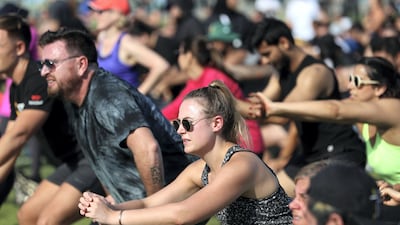During my recent visit to the UAE, I witnessed first-hand the country’s commitment to harnessing sport as a driver of social, cultural and economic growth. The Abu Dhabi HSBC Championship was teeing off for its 19th edition, the Dubai Fitness Challenge was in full swing (which I enthusiastically joined), and the echoes of cricket’s successful ICC Women’s T20 World Cup resonated in every conversation.
At Yas Links Golf Club in Abu Dhabi, I was struck by the notably strong turnout of women spectators. Similarly, Dubai’s 30x30 events exemplified the UAE’s use of sport to foster community engagement and well-being. The widespread popularity of these initiatives demonstrates the UAE’s success in using sport as both a catalyst for change and a nation-building tool.
This wasn’t my first exposure to the region’s sporting transformation, though. During my service as the UK’s minister of sport, culture and heritage, I had the privilege of meeting Princess Reema bint Bandar Al Saud, who was then the first Saudi female president of the kingdom’s Federation for Community Sports. Her rousing leadership has inspired a new generation of women in the kingdom and beyond to engage with sport – whether as athletes, fans or professionals in the industry.

Back in Abu Dhabi, I met the managers of UAE Team ADQ, the country’s pioneering all-female cycling team. Their star cyclist, Safiya Alsayegh, a seven-time national champion and the UAE’s first female Olympic cyclist, represents a new wave of Arab women embracing competitive sport and taking it to the next level, with her success clearly part of the country’s ambition to double its Olympic athlete participation to 28 by 2032.
But this is no surprise, as the progress for women in sport is also felt at the micro-level, where a recent study revealed that nearly half of adult sports fans in the Emirates prefer watching women’s sports to men’s, compared to just 12 per cent in the UK.
Of course, this growing confidence in the region must also be credited to Qatar, whose successful delivery of the 2022 men’s Fifa World Cup proves unequivocally that the region can host major tournaments. It led the region into a new era where global sporting ambitions are no longer aspirational, but achievable realities.
Only two years after winning the bid and with a decade to go until kick-off, Qatar embedded sport into its national mindset by becoming the first country to dedicate National Sports Day as a public holiday, promoting activity across the country. Qatar’s achievement was not merely about football, but a testament to its ability to leverage the hosting of mega events as catalysts for broader development, as after the tournament concluded it contributed to 4 per cent of the country’s gross domestic product.
With Saudi Arabia set to host the same tournament in 2034, this expertise will soon extend to Riyadh, Jeddah and the emerging metropolis of Neom – already making its mark with the Neom Beach Games and the 2029 Asian Winter Games. It will also be another part of a wider push to economic diversification from a hydrocarbon economy to non-oil sectors.
This growth extends far beyond mere event hosting – it’s about creating complete sporting ecosystems.
When a new stadium rises from the ground, it accelerates the development of entire districts – from hotels and restaurants to entertainment venues and retail spaces. In the same way Wembley Stadium transformed north-west London into an entertainment destination that extends far beyond football, Abu Dhabi’s Zayed Sports City Stadium will soon play host to record attendance numbers when Coldplay arrives early next year, and in Saudi Arabia, Qiddiya will become not only the nation’s prime entertainment district, but also home to its new Formula One circuit.
The social impact is equally transformative.
At a time when lifestyle-related health challenges are a global concern, investing in sport is a powerful public health tool. Every new community sports facility, public running track and neighbourhood football pitch or basketball court contributes to building a more active society. Youth engagement in sport has been particularly effective, not only improving physical and mental health but also strengthening community bonds.
Looking ahead, the sporting calendar tells its own story. With this year’s Formula One calendar coming to a close with races in Qatar and the UAE in the coming weeks, and with Fifa set to officially confirm Saudi Arabia as 2034 World Cup hosts, the momentum shows no signs of slowing.
This sporting journey offers valuable lessons for the global community. It demonstrates how strategic vision, combined with substantial investment and genuine commitment to inclusivity, can drive broader economic and societal transformation, empower women in sport, create high-skilled jobs, foster innovation and build healthier communities.
It is essential to share these success stories with the world, inspiring others to follow this example and foster new collaborations and partnerships. By communicating its vision and accomplishments, the UAE and wider region can create a ripple effect that extends far beyond its borders.
The Gulf’s message is clear: game on.



